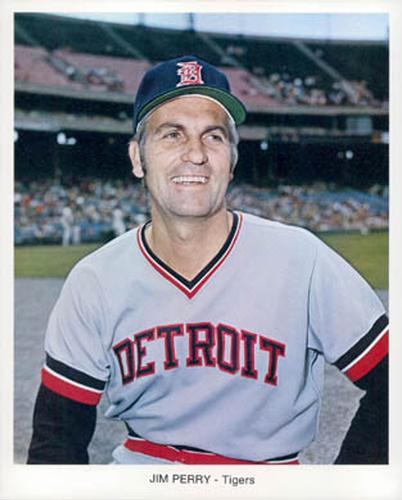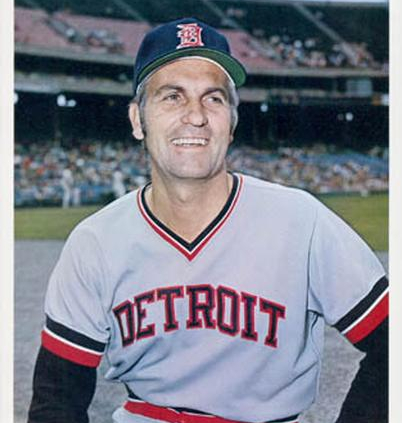July 3, 1973: Perry brothers make pitching history, but home runs ruin their outing
 Jim Perry debuted with the Cleveland Indians in 1959, became a Minnesota Twin in 1963, and moved to the Detroit Tigers in 1973. His younger brother, Gaylord Perry, spent the first 10 years of his career in the National League before being traded to Cleveland in December 1971.
Jim Perry debuted with the Cleveland Indians in 1959, became a Minnesota Twin in 1963, and moved to the Detroit Tigers in 1973. His younger brother, Gaylord Perry, spent the first 10 years of his career in the National League before being traded to Cleveland in December 1971.
Through June 1973, Jim Perry had started 378 major-league games and Gaylord Perry had started 343. Both right-handers had American League Cy Young Awards: Jim with the Twins in 1970 and Gaylord with the Indians in 1972. But the Perry brothers had never started against each other, thanks to pitching in opposite leagues for 10 years, then never having their teams’ rotations line up during their first season and a half together in the AL.
They finally got the opportunity on July 3, 1973, when Gaylord Perry’s Indians hosted Jim Perry’s Tigers in what turned out to be Jim’s only season in Detroit. It was the first time in the American League that brothers started against each other.1 A seventh-inning Tigers rally handed Gaylord Perry the loss, while giving Jim Perry a no-decision in Detroit’s 5-4 win.
It was a Tuesday night game at Cleveland Stadium before a slim crowd of 9,064. Coming into the contest, 37-year-old Jim had a record of 8-7 with a 3.10 ERA, while 34-year-old Gaylord was 8-10 with a 3.13 ERA.
Detroit was looking to stay in the mix with the Baltimore Orioles and Milwaukee Brewers for second place in the AL East Division, behind the first-place New York Yankees. Cleveland was already out of contention for the season, 17½ games behind the Yankees.
Gaylord recalled in his autobiography that his father called him before the game, saying, “I’m rooting for shutout pitching for both of you for nine innings and then let your relief pitchers take over to decide the winner.” Gaylord responded, “No way I’m leaving a game with a shutout going.”2
He was still reeling from his starts against the Yankees on June 25 and 29 in which he was accused of using an illegal substance on his pitches.3 Fanning the flames of the controversy, Detroit manager Billy Martin reportedly sent a message to Gaylord before the game saying he had a German shepherd dog penned up in the Tigers’ clubhouse, trained to detect greasy substances.4
The brothers made light of the recent media coverage surrounding Gaylord. The next day’s Cleveland Plain Dealer featured a photo of Gaylord jokingly checking his brother’s hand for grease before the game.5 Of course, Gaylord was the one suspected of using foreign substances, not Jim.
Gaylord got off to a rocky start in the first inning, as he gave up Norm Cash’s 11th home run of the season, a two-run blast to right field. He allowed 34 homers during 1973, third-most in the AL.
Jim allowed only one hit in his first three innings before running into trouble in the fourth. He gave up a single to John Lowenstein and walked John Ellis before 22-year-old rookie designated hitter Charlie Spikes hit a shot down the right-field line and into the seats.
Umpire Merle Anthony declared that the ball hit the foul pole for a home run. The Tigers disputed the call, arguing that their bullpen staff positioned in right field insisted the ball was foul by at least a foot. The instant replay by the Tiger TV network appeared to indicate the ball was fair but did not hit the foul pole.6 Despite the protests, Anthony’s decision was final. Spikes’ homer was his 15th of the season.7
The score remained 3-2 until the bottom of the sixth. The Indians increased their lead on Oscar Gamble’s leadoff home run, his 12th of the season. After Jim Perry hit Spikes and gave up a double to George Hendrick, he was replaced by Ed Farmer, who escaped the inning without further scoring.8
Gaylord Perry had settled in after Cash’s home run, limiting the Tigers to only a single until the seventh. But Cash became his nemesis again, with a first-pitch leadoff home run to center field. Cleveland’s lead was down to 4-3.
One out later, Jim Northrup singled and took second on a wild pitch. Rich Reese singled to score Northrup with the tying run. A passed ball with Aurelio Rodríguez at bat moved Reese to second. After Rodríguez struck out, Ed Brinkman’s single scored Reese. Jerry Johnson replaced Gaylord Perry and got the final out of the inning. But the damage had been done. The Indians’ two-run lead was now a one-run deficit.
Cleveland made a comeback bid in the bottom of the eighth. Ellis and Spikes walked after one out. With right-hander Farmer scheduled to face left-handed-hitting Chris Chambliss and the potential tying and go-ahead runs on base, Billy Martin summoned lefty John Hiller from the bullpen. Indians manager Ken Aspromonte countered with pinch-hitter Walt Williams, who flied out to left. Hiller then shut down the Indians’ rally by striking out Hendrick.
Hiller finished the Tigers’ 5-4 win to record his 19th save of the season. Farmer was credited with his third win since his arrival to Detroit via trade on June 15. Gaylord Perry suffered his 11th loss of the season.
Jim Perry lamented Spikes’ controversial home run. He said, “I should’ve won and I would’ve if the umpire hadn’t called the ball wrong. There’s no way that ball is fair, and you can ask anybody who was in the bullpen.”9 Yet he gave Spikes credit for the blast. “He hit a heck of a pitch. To tell you the truth, I don’t know how he did it. It was a fastball down and away and he just threw his bat at the ball, it seemed.”10
Tigers pitcher Woodie Fryman, who was in the bullpen at the time of Spikes’ home run, supported Jim’s assertion that the ball had turned foul. He said, “It was foul by at least three inches. You could see where it skipped on the top of the wall because it disturbed the dust up there.”11
On a night when Gaylord Perry said he felt good coming into the game, Cash appeared to have his number. Gaylord explained the pitches that resulted in the home runs. “On the first one, he hit a pretty good forkball. The second homer was off a forkball, too, but it didn’t sink.”12
The Tigers’ win was their ninth in 10 games. They ended up third in the division. Cleveland suffered its seventh straight loss. The Indians remained in last place, eventually sinking to 26 games behind division-winning Baltimore.
In 1974 the brothers played on the same team for the first time, winning 38 games between them and posting sub-3.00 ERAs for the Indians.13 After that, Jim pitched only one more season. Gaylord continued until 1983, retiring at age 44. Jim finished with 17 seasons, while Gaylord put in 22.
As of 2024, the Perrys (529) were surpassed only by Phil and Joe Niekro (539) for career wins by brothers, but narrowly edge the Niekros in strikeouts, 5,110 to 5,089.14
Acknowledgments
This article was fact-checked by Jim Sweetman.
Sources
In addition to the sources listed in the Notes, the author consulted Baseball-Reference.com and Retrosheet.org for pertinent information, including the box score and play-by-play.
https://www.baseball-reference.com/boxes/CLE/CLE197307030.shtml.
https://www.retrosheet.org/boxesetc/1973/B07030CLE1973.htm.
Notes
1 Pitchers Virgil and Jesse Barnes were the first pair of brothers in the National League to start a game against each other, in 1924. “Virgil Barnes,” SABR BioProject, https://sabr.org/bioproj/person/virgil-barnes/. Accessed May 21, 2024.
2 Gaylord Perry and Bob Sudyk, Me and the Spitter: An Autobiographical Confession (New York: Saturday Review Press/E.P. Dutton & Co., 1974), 215.
3 Russell Schneider, “Injuns Livid – Demand Cosell and Bragan Scalps,” The Sporting News, July 21, 1973: 7. Gaylord’s reputation for using the spitter received attention when he faced the Yankees on June 25. Yankees manager Ralph Houk went to the mound while Gaylord was pitching and tried to check him for a greasy substance. On another occasion during the game, he brought umpire Lou DiMuro to the mound to look for evidence of Gaylord using grease. Yankees third-base coach Dick Howser insisted that he found a grease smudge on a ball that had been fouled off. But none of these claims of cheating could be substantiated. In an interview after the game, Yankees outfielder Bobby Murcer called out Commissioner Bowie Kuhn and American League President Joe Cronin for not enforcing the rule prohibiting the use of spitballs. Murcer was subsequently fined $250 by the commissioner. When Gaylord opposed the Yankees again on June 29, the ABC television network put a camera on Gaylord while he was on the mound, to see if he could be caught cheating. There wasn’t an incident during the game. But afterward sportscaster Howard Cosell and former major-league player and manager Bobby Bragan were slated to provide a postgame interview about their observations. Bragan, at the urging of Cosell, insisted that Perry cheated, when off-the-camera he had previously told reporters he had not seen any evidence. The Indians’ front office later complained to the commissioner’s office about ABC’s apparent witch-hunt.
4 Jim Hawkins, “Strahler Strolls Into Focus on Tiger Mound,” The Sporting News, July 21, 1973: 22.
5 Russell Schneider, “Tribe Falls; Neither Perry Finishes, Cleveland Plain Dealer, July 4, 1973: 1-D.
6 Jim Hawkins, “Perry Bros. KOd … Tigers Win,” Detroit Free Press, July 4, 1973: 1-B.
7 Jim Perry gave up 22 home runs in 1973, which did not rank him in the league’s top 10, although he had led AL pitchers in that category twice (1960 and 1971).
8 Ed Farmer had just been traded to Detroit on June 15. He requested the trade because he was unhappy with his lack of utilization out of the bullpen. Russell Schneider, “Tribe Gets Indians’ Timmerman,” Cleveland Plain Dealer, June 16, 1973: 4-D.
9 Perry and Sudyk.
10 Schneider, “Tribe Falls; Neither Perry Finishes,” 2-D.
11 Schneider, 2-D.
12 Schneider, 2-D.
13 Jim won 21 games and lost 13. Gaylord was 17-12.
14 The Niekros gave up a career total of 758 home runs (Phil, 482, Joe, 276). The Perrys gave up a total of 707 (Gaylord, 399, Jim, 303).
Additional Stats
Detroit Tigers 5
Cleveland Indians 4
Cleveland Stadium
Cleveland, OH
Box Score + PBP:
Corrections? Additions?
If you can help us improve this game story, contact us.


